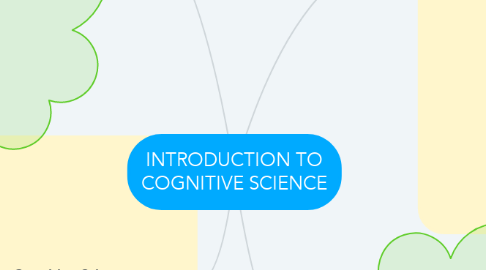
1. Cognitive Science Developmental History
1.1. The Beginnings
1.1.1. Province of Philosophy
1.1.2. Epitemology, rationalism
1.1.3. Plato, Descartes, Liebniz, Aristotle
1.2. Development of Experimental Psychology
1.2.1. Introspection
1.2.2. Behaviorism
1.3. Emergence of Cognitive Science
1.3.1. Capacity of human thinking limited
1.3.2. Growth of Artificial Intelligence
1.3.3. Development in Linguistics
2. Understanding the Science of Cognition
2.1. Science
2.1.1. - Latin word (scientia) meaning "knowledge" - A systematic enterprise that builds and organizes knowledge in the form of testable explanations and predictions about the universe.
2.2. Cognition
2.2.1. - The mental action or process of acquiring knowledge and understanding through thought, experience, and the senses - All processes by which sensory input is: Transformed, reduced, elaborated, stored, recovered, used.
2.3. Cognitive Processes
2.3.1. - Problem solving - Learning - Language - Reasoning - Perception - Imaging - Memory
2.4. Cognitive Capability
2.4.1. Obtain - Sensation, perception, attention Store - Memory, representation Utilize - Day-to-day
2.5. Contributing Disciplines
2.5.1. - Psychology - Neuroscience - Linguistic - Artificial Intelligence - Education - Anthropology - Philosophy
3. Introduction to Cognitive Science
3.1. The Psychological Approach
3.1.1. Cognitive psychologists try to build up cognitive models of the information processing that goes on inside people’s minds, including perception, attention, language, memory, thinking, and consciousness.
3.2. The Linguistic Approach
3.2.1. Cognitive psychologists try to build up cognitive models of the information processing that goes on inside people’s minds, including perception, attention, language, memory, thinking, and consciousness.
3.3. The Neuroscience Approach
3.3.1. An interdisciplinary approach to studying the mind and behavior, noted for its appreciation for the dynamic interactions of situational and dispositional processes as they relate to neural and biological mechanisms
3.4. The Artificial Intelligence Approach
3.4.1. artificial intelligence approaches can be classified into three distinct groups: brain simulation, symbolic and sub-symbolic, and statistical.
3.5. The Philosophical Approach
3.5.1. The oldest of all disciplines in CS and formulating & answering questions about the universe
3.6. The Anthropological Approach
3.6.1. Study of the relation between human culture and human thought
3.7. The Learning Sciences Approach
3.7.1. Basic research about the brain mechanisms underlying learning in humans and other species
4. Study of Human Cognition
4.1. Early Approaches
4.1.1. Accounting for Differences: Franz Joseph Gall
4.1.2. Accounting for Differences: Paul Broca
4.2. More Recent Approaches
4.2.1. Sensory Functions of the Brain
4.2.2. That sensory & motor functions can be localized in specific regions of the brain
